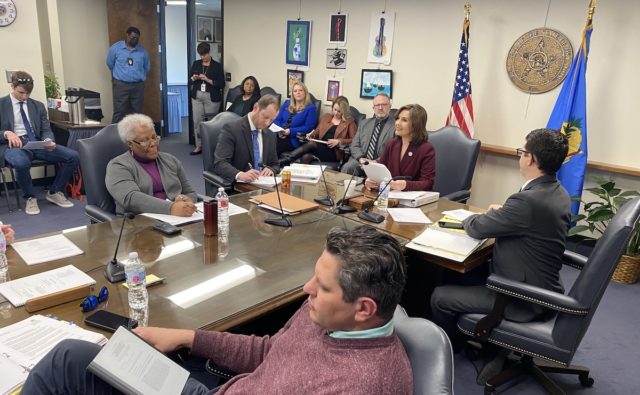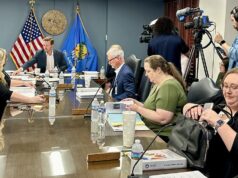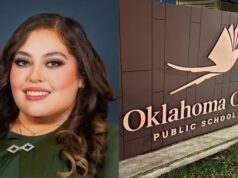

At a meeting today, State Board of Education members approved permanent rules for the controversial HB 1775, which bans the teaching of certain concepts about race and gender in Oklahoma public schools.
“Our focus is to ensure that teachers have specificity that comes with the academic standards and that they have the tools they need to be able to teach those standards,” State Superintendent of Public Instruction Joy Hofmeister told reporters after the meeting. “These are rules that help provide greater clarity and comply with the law.”
HB 1775 prohibits Oklahoma public school teachers from teaching that “any individual, by virtue of his or her race or sex, is inherently racist, sexist or oppressive, whether consciously or unconsciously,” that “any individual should feel discomfort, guilt, anguish or any other form of psychological distress on account of his or her race or sex” or that “meritocracy or traits such as a hard work ethic are racist or sexist or were created by members of a particular race to oppress members of another race.”
Emergency rules for the implementation of HB 1775 approved by the Board at a meeting in July included requiring public school districts to develop a process for parents, students, teachers, school staff and the public to file complaints for alleged violations. The emergency rules also required school districts to investigate legally sufficient complaints.
State Department of Education Legal Counsel Brad Clark said the emergency rules were put out for public comment for a period of 30 days beginning on Jan. 3. A hearing for public comment was held on Feb. 2.
“In total, approximately 1,050 comments were received,” Clark told board members during Thursday’s meeting. “By comparison, and I’m new at this quite frankly, having looked at others in the past I think 100 or maybe 200 would’ve been a high volume of comments.”
The permanent rules, which span about eight pages and were approved without discussion, are similar to the emergency rules but include two additional prohibitions:
- Public schools in the state shall be prohibited from requiring students to complete surveys, or using the results from surveys, to teach discriminatory concepts.
- Public schools in this state shall be prohibited from joining any group or association that require, as a condition of membership, teachers, administrators or other employees of a school district, charter school or virtual charter school to teach, provide instruction, or offer any course that includes, incorporates or is based on discriminatory practices.
The permanent rules also require school districts to report complaints to the State Department of Education within 10 days rather than the 30 allowed by the emergency rules. The OSDE will also be required to report complaints to the State Board monthly rather than quarterly.
Hofmeister said the changed language reflects the intent of the legislation.
“We are focused on ensuring that our kids have the support they need, but also that teachers have specificity on teaching the academic standards,” Hofmeister said.
‘This law is an equity gag order’
Comments from the public regarding the permanent rules are published on the OSDE website and include requests for clarification on how to report violations, more frequent reporting by districts and the OSDE and protections for individuals who file complaints.
One comment in opposition to HB 1775 states, “we need to have our children learn true historical facts.” Another comment expresses “grave concerns about the nature of the law as it surpasses the voices of people of color and our full history. This law is an equity gag order that unfairly ties the hands of skilled, well-trained teachers.”
During the public comment portion of Thursday’s meeting, John Guinn, state director for the organization Convention of States, criticized board members for their handling of public comment on the creation of the permanent rules.
“I’d like to express my strong objection to the public posting of public comment submitted to the department which revealed personally identifiable information on commentators,” Guinn said. “Some of the members expressed sentiment that it seemed to be an attempt at intimidation for those that wished to respond.”
Guinn claimed that while violations of HB 1775 haven’t been obvious, school districts have been “maximizing loopholes” in the rules.
“Parents and other stakeholders across the state submitted over 500 public comments seeking genuine and reliable changes to the rule that would curb the misconduct and noncompliance with HB 1775,” Guinn said. “Instead of relying on the experiences of parents and on the feedback provided by hundreds of families and citizens, the board opted to play it safe at the expense of our children.”
When asked by NonDoc after the meeting if Guinn’s comments had any merit, Hofmeister said that she couldn’t speak to the process but that “public comment is public comment.”
A lawsuit filed by the Americans Civil Liberties in October claims HB 1775 is unconstitutional under the First and 14th Amendments. The lawsuit states that the law “severely restricts discussions on race and gender in Oklahoma’s elementary, secondary and higher education schools without any legitimate pedagogical justification, using language that is simultaneously sweeping and unclear.”
Defendants in the lawsuit include Oklahoma Gov. Kevin Stitt; Attorney General John O’Conner; Hofmeister; State Board of Education members William Flanagan, Carlisha Bradley, Jennifer Monies, Estella Hernandez, Brian Bobek and Trent Smith; members of the Oklahoma State Regents for Higher Education and of the University of Oklahoma Board of Regents; Edmond Public Schools Superintendent Angela Grunewald and members of the Edmond Public Schools Board of Education.




















